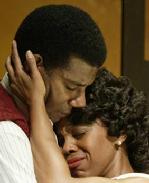SITE GUIDE
SEARCH
REVIEWS
FEATURES
NEWS
Etcetera and
Short Term Listings
LISTINGS
Broadway
Off-Broadway
NYC Restaurants
BOOKS and CDs
OTHER PLACES
Berkshires
London
California
DC
Philadelphia
Elsewhere
QUOTES
On TKTS
PLAYWRIGHTS' ALBUMS
LETTERS TO EDITOR
FILM
LINKS
MISCELLANEOUS
Free Updates
Masthead
Writing for Us
A CurtainUp Review
Second Line
|
The Second Line is a spiritual and musical tradition with African roots prevalent from the 1880s to the Harlem Renaissance years and into the 1950s. The Second Line originated with the West African belief that the spirit of the deceased is "active" and should be placated. A "second line" of spectators joins the funeral procession; animated, dancing, strutting, clapping, hollering and generally "appeasing" the spirit of the deceased. —excerpts from The Encyclopedia of the Harlem Renaissance were provided by the Passage Theater |

Billy Eugene Jones and April Yvette Thompson
|
Now that’s a lot of heavy duty material to stuff into a 90-minute play with only two people. But it is good to report that Scott has probably exceeded her expectations with this vibrantly written, beautifully acted, and effectively directed play that tells the story of two impassioned African-Americans college students who fall in love in the early 1960s. Although deeply in love, one of them feels that their conflicting convictions necessitates a separation. This is the difficult decision they make, as they move on to pursue different paths in their determination to be assets to themselves and to their race and it is at the heart of this play developed and workshopped at both the McCarter Theater and Passage Theater Company where it is now having its world premiere.
Bennie (Billy Eugene Jones) and JoJo (April Yvette Thompson) are both scholarship students at the University of Pennsylvania who, not surprisingly, find one another among a sea of white faces. Their relationship blossoms and deepens even as their individual sense of mission begins to act as a wedge. Scott’s key (no pun intended) to making the drama as involving as it is is to shift our attention back and forth between Bennie and JoJo. As a result, we see how their lives and careers evolve and take a defining shape.
Bennie serves as the play’s narrator as well as the bridge between the juxtaposed personal experiences. Bennie’s awareness that "the black middle class isn’t privileged," and "you have to fight your way through college," is contrasted against JoJo’s pull to go south ("the real battleground is the South"). As we follow Bennie from graduation to becoming a successful stock broker and getting involved in another short-lived romance, we also see Jojo’s life as it unfolds with her commitment to protest and to becoming a leader in the Civil Rights Movement struggle for freedom and justice.
Jones, who appeared in the Broadway productions of A Raisin in the Sun and Gem of the Ocean and recently appeared in the Hurricane Katrina-themed Waiting for Godot at the Classical Theater of Harlem, gives not only a sturdily secure performance as the success-oriented Bennie, but invests the role with an impassioned sensitivity. Thompson’s performance is especially touching in how it reflects her developing maturity over the decades and from continent to continent. Although best known for her directing work (she is an Associate Artist of the Old Globe Theater in San Diego and directed productions at major regional theaters) her writing style is so eloquent and her characters so rich and vital that we never feel the need for others to give this story life, breath and depth.
The play’s most poignant and impassioned consideration, however, are the intense but conflicted feelings that Bennie and JoJo continue to feel for each other. He needs her and she needs validation. This is the major dynamic in this play that has been nicely and cleverly directed by Regge Life.
The action takes place in an uncluttered bi-level setting (cleanly designed by Ryan Scott) that allows the two stories to unfold and occasionally overlap. This play is a winner and will undoubted have a future in regional theaters, possibly Off-Broadway.
|
Second Line By Seret Scott Directed by Regge Life Cast: Billy Eugene Jones, April Yvette Thompson Set Design: Ryan Scott Costume Design: Gail Cooper-Hecht Lighting Design: Kazuko Oguma Sound Design: Regge Life Running Time: 1 hours 30 minutes with no intermission Passage Theater Company at the Mill Hill Playhouse, at the intersection of Front and Montgomery Streets in Trenton, N.J. 609/392-0766, www.passagetheatre.org Opening night Saturday October 7, 2006; Performances through October 29. Thursday, Friday & Saturday at 8 PM; Sunday 3 PM Tickets: $25 Review by Simon Saltzman based on performance October 7, 2006 Reviewed by based on performance |
//-->

Easy-on-the budget super gift for yourself and your musical loving friends. Tons of gorgeous pictures.

Leonard Maltin's 2007 Movie Guide

At This Theater

 >
>

